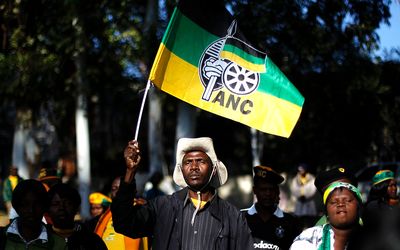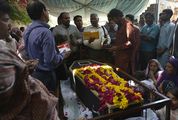Battle of PE is about the ANC’s political soul
by Sam Mkokeli,
2016-03-08 05:45:00.0
DO NOT ask me why some of the stalwarts who went to Robben Island as part of the struggle against Afrikaner domination ended up being addressed as "Oom", like Oom Ray and Oom Gov. These two late stalwarts have been on my mind lately as I ponder the significance of the "battle of PE" in the coming local elections.
Both men spent their last days in Port Elizabeth. I was lucky enough to have fairly extensive interactions with Oom Ray (Raymond Mhlaba) before he died. The Rivonia triallist spent 26 years in prison, one year shy of Nelson Mandela’s 27. Ndobe, as Madiba and others called Oom Ray, could not swear, even in anger.
Ahmed Kathrada, another esteemed African National Congress (ANC) stalwart, once told me Oom Ray got so upset at a Robben Island prison warder once that he just about used a swearword. Uncle Kathy was one of the prisoners egging him on, shouting "swear him". "You fascist," Oom Ray eventually shouted at the warder.
Mac Maharaj has a slightly different account. He says Oom Ray got so angry that the F-word slipped out of his mouth, but he quickly performed vocal gymnastics so that it sounded like "fascist". Uncle Mac (I have yet to hear him being addressed as Oom) says it was Oom Ray’s missionary schooling that inhibited his lyrical freedom, hence he could not swear.
As the elections edge closer, I wonder how the two stalwarts would respond to the prospect of a Democratic Alliance government in their adopted home town. The battle of PE is much more than just a question of who will wear the mayoral chains. It is partly about the political capital in the city that was once the ANC’s heartland.
PE is where Oom Ray organised workers in the 1940s. Like Soweto, PE was one of the urban centres in which the flames of student activism lit up in the ’70s, giving energy to a liberation struggle that had somewhat lost its fizz. Some of the prominent personalities from that era and area are Saki Macozoma, Vusi Pikoli, Khusta (Mkhuseli) Jack, who used rugby and school politics networks to contribute to the struggle for freedom. While Jack has moved on and watches the ANC with a healthy dose of disdain from the business world, Pikoli and Macozoma still have strong links to their township and the ANC. But the ANC keeps them at arm’s length, thereby missing out on their skills and influence.
The ANC’s regression in PE has been a slow and painful process, exactly what is now happening at national level. One of the characters in this story is Nceba Faku, known as the "giraffe" due to his height. He became SA’s first black mayor in 1993. When democratic local government was properly introduced in 2000 — when the ANC got 65.7% of the vote — Faku was well accustomed to the trappings of power. So much so that the municipality bought him a throne.
Part of the ANC’s downfall was its association with narrow business groups, something that exemplified the capture of the state by powerful corporates and predatory political networks. Demonstrating disregard for the need for political stability and a professional public service, the ANC has, over the years, changed mayors and municipal managers like others change underwear. That the municipality bought two dozen articulated buses from Brazil at R3.8m each just before the 2010 Fifa World Cup that are standing idle today, is one of the unfathomable stories of ineptitude that might have drawn a couple of F-words from Oom Ray.
As a result of a web of destructive relations between pit-bull style politicians and administrators, the ANC is now hanging on by a thread, trying to defend the 52.1% it got five years ago.
The battle of PE is bigger than just the prospects of a floundering party whether or not the ANC pulls itself back from the precipice. For the "neutrals" watching from a distance, it is a story of democracy and competitive elections, something we could do with at national level too.
• Mkokeli is associate editor

Part of the ANC’s downfall was its association with narrow business groups, something that exemplified the capture of the state by powerful corporates and predatory political networks, says the writer. Picture: REUTERS/SIPHIWE SIBEKO
DO NOT ask me why some of the stalwarts who went to Robben Island as part of the struggle against Afrikaner domination ended up being addressed as "Oom", like Oom Ray and Oom Gov. These two late stalwarts have been on my mind lately as I ponder the significance of the "battle of PE" in the coming local elections.
Both men spent their last days in Port Elizabeth. I was lucky enough to have fairly extensive interactions with Oom Ray (Raymond Mhlaba) before he died. The Rivonia triallist spent 26 years in prison, one year shy of Nelson Mandela’s 27. Ndobe, as Madiba and others called Oom Ray, could not swear, even in anger.
Ahmed Kathrada, another esteemed African National Congress (ANC) stalwart, once told me Oom Ray got so upset at a Robben Island prison warder once that he just about used a swearword. Uncle Kathy was one of the prisoners egging him on, shouting "swear him". "You fascist," Oom Ray eventually shouted at the warder.
Mac Maharaj has a slightly different account. He says Oom Ray got so angry that the F-word slipped out of his mouth, but he quickly performed vocal gymnastics so that it sounded like "fascist". Uncle Mac (I have yet to hear him being addressed as Oom) says it was Oom Ray’s missionary schooling that inhibited his lyrical freedom, hence he could not swear.
As the elections edge closer, I wonder how the two stalwarts would respond to the prospect of a Democratic Alliance government in their adopted home town. The battle of PE is much more than just a question of who will wear the mayoral chains. It is partly about the political capital in the city that was once the ANC’s heartland.
PE is where Oom Ray organised workers in the 1940s. Like Soweto, PE was one of the urban centres in which the flames of student activism lit up in the ’70s, giving energy to a liberation struggle that had somewhat lost its fizz. Some of the prominent personalities from that era and area are Saki Macozoma, Vusi Pikoli, Khusta (Mkhuseli) Jack, who used rugby and school politics networks to contribute to the struggle for freedom. While Jack has moved on and watches the ANC with a healthy dose of disdain from the business world, Pikoli and Macozoma still have strong links to their township and the ANC. But the ANC keeps them at arm’s length, thereby missing out on their skills and influence.
The ANC’s regression in PE has been a slow and painful process, exactly what is now happening at national level. One of the characters in this story is Nceba Faku, known as the "giraffe" due to his height. He became SA’s first black mayor in 1993. When democratic local government was properly introduced in 2000 — when the ANC got 65.7% of the vote — Faku was well accustomed to the trappings of power. So much so that the municipality bought him a throne.
Part of the ANC’s downfall was its association with narrow business groups, something that exemplified the capture of the state by powerful corporates and predatory political networks. Demonstrating disregard for the need for political stability and a professional public service, the ANC has, over the years, changed mayors and municipal managers like others change underwear. That the municipality bought two dozen articulated buses from Brazil at R3.8m each just before the 2010 Fifa World Cup that are standing idle today, is one of the unfathomable stories of ineptitude that might have drawn a couple of F-words from Oom Ray.
As a result of a web of destructive relations between pit-bull style politicians and administrators, the ANC is now hanging on by a thread, trying to defend the 52.1% it got five years ago.
The battle of PE is bigger than just the prospects of a floundering party whether or not the ANC pulls itself back from the precipice. For the "neutrals" watching from a distance, it is a story of democracy and competitive elections, something we could do with at national level too.
• Mkokeli is associate editor



















Change: -0.47%
Change: -0.57%
Change: -1.76%
Change: -0.34%
Change: 0.02%
Data supplied by Profile Data
Change: -1.49%
Change: 0.08%
Change: -0.47%
Change: 0.00%
Change: -0.04%
Data supplied by Profile Data
Change: -0.30%
Change: 0.17%
Change: -0.32%
Change: -0.66%
Change: 0.47%
Data supplied by Profile Data
Change: 0.32%
Change: 0.21%
Change: 0.53%
Change: 0.00%
Change: 0.49%
Data supplied by Profile Data